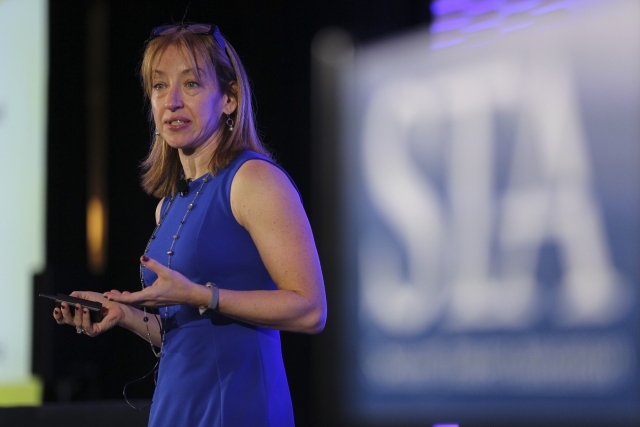
President, Autism Science Foundation
As a parent, there are few things scarier than thinking your child may not be developing appropriately. With 1 in 59 children diagnosed with an autism spectrum disorder, it’s critical to be aware of the early warning signs of developmental delay and to take action if you have concerns. Early intervention can make a world of difference in a child’s life.
Autism Spectrum Disorders are characterized by significant impairments in social interaction and communication skills, as well as by the presence of extremely challenging behaviors, like stereotyped motor behaviors (hand flapping, body rocking), insistence on sameness, resistance to change and, in some cases, aggression or self-injury. Many individuals with autism spectrum disorder have significant cognitive impairments, although some have typical or even above average IQs.
We don’t know exactly what causes autism, although the idea that vaccines might cause autism has been disproven by multiple scientific studies, and the notion that autism is caused by bad parenting has also been thoroughly debunked. Through scientific research funded by the Autism Science Foundation, we have learned that autism is a genetic disorder that may be triggered by environmental factors that take place during the second semester of pregnancy.
Early signs of autism can be detected in infants as young as 6-18 months. For example, if a baby fixates on objects (like ceiling fans) and does not respond to people, he or she may be exhibiting early signs of an autism spectrum disorder. Older babies and toddlers may fail to respond to their names, avoid eye contact, play with toys in strange ways, or engage in repetitive movements such as rocking, or arm flapping. Parents who notice these signs, or who are concerned their children are not meeting developmental milestones, should contact their pediatricians and request a developmental screening.
Scientists agree that the earlier a child receives early intervention services the better his or her prognosis. All children with autism can benefit from early intervention. The most effective treatments available today are applied behavioral analysis (ABA) and occupational, speech and physical therapy. Many “cures” for autism are touted on the internet, but many of these interventions are not backed by science and can often cause harmful side effects.
The Autism Science Foundation, headquartered in New York City, was founded by parents of children with autism to support autism research, to increase awareness of the early warning signs of autism, and to encourage parents to act early if they suspect their child may have a developmental delay. Through our research, we have developed age-appropriate applied behavior analysis interventions that can be highly effective for children with learning delays. Studies show that with intensive early intervention programs, 50% of children diagnosed with autism at age 3 are able to attend mainstream kindergarten by age 5. Our challenge is to identify children early, and start early intervention services as soon as possible, so that our kids are able to maximize their potential. For this reason, a good deal of our research is currently focused on identifying a biomarker that would enable children with autism to be identified as early as birth.
We are so proud to partner with the Security Traders Association to help bring greater awareness of autism to its members. After I spoke at the 2018 annual conference, we received several dozen emails and calls from STA members concerned about their child’s development, or about a niece, nephew, or grandchild’s development. We are here to answer your questions and help you find appropriate resources. Often grandparents and aunts or uncles who have older kids are in the better position to notice a developmental delay than a new parent. If you have a concern, speak up. And please don’t hesitate to contact us if you have a concern. The key is to act early! Learn more about the early warning signs of autism and about how you can support autism research efforts at www.autismsciencefoundation.org .
If you have a specific concern about a young family member, please email us at contact us @autismsciencefoundation.org
